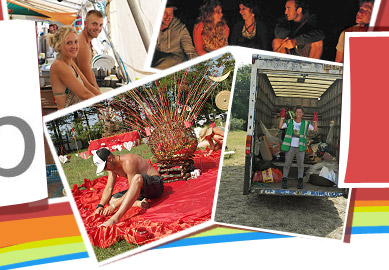They have done it! > 2008 > Lithuania

Pazaislis Monastery, Lithuania
August/September 2005
I wanted to do something different from my every day life, meet people from different countries and work in an unusual environment.
We worked for five hours a day in the grounds of the Pazaislis Monastery, painting fences, collecting apples, digging holes, cleaning the chapel, moving huge piles of wood. On some occasions, I got the impression we were going about the work in an inefficient way, nevertheless, we were useful, as we did tasks that the nuns clearly were not going to do themselves, and the group worked well together.
The nuns were sometimes unclear about what exactly they wanted to be done. However, the leaders were good at splitting the ten volunteers into groups to do the work, and motivated us well. The leaders quickly drew up a timetable of who would do the cooking and cleaning each day, which was useful. They were both very well liked, excellent at liaising with the nuns (they were our only two Lithuanian speakers) and I got the impression that they were actively interested in making sure we really enjoyed our stay. They both made meal times genuinely enjoyable occasions, with lots of interesting discussions. As a result of their work, the volunteers quickly bonded. The leaders were very helpful in arranging trips for our spare time, to Rumsiskes, Kaunas and other nearby destinations. They managed to borrow us a guitar and speakers so that we could play and listen to music in the evenings. They organised campfires and games and fostered an excellent group spirit. They ensured that, during our time off, we had fun, which meant that the general atmosphere was very friendly.
We met the leaders’ family and friends, who came to visit us in the camp. We spoke to several of the nuns who spoke English. The best way to have improved our community links would have been for us to have learnt some basic Lithuanian, as most older people only spoke a small amount of English.
One evening, we all acted out plays. We were given a genre (tragedy, musical, etc.) and three objects which we had to work into our ten-minute production. We were split into groups of three and then had half an hour to rehearse. This was a brilliant, simple idea, and everyone really enjoyed it.
To my great surprise and pleasure, half way through the camp, the monastery held a huge open-air concert in the grounds, where several opera singers sang arias, with a 60-person choir and huge orchestra. As volunteers, we were permitted to sit in the front row. It was a great event and, as it happens once a year, I had no idea we would be there when it happened.
The best things about the workcamp and my whole experience were:
The campfire evenings. Cooking sausages on the fire while teaching the Japanese guy how to play Oasis on guitar and teaching the German girls Cockney rhyming slang.
The open-air concert. The music (from Carmen and Faustus, etc.) was great and we watched it with about 1000 people.
The hilarity of helping a hugely embarrassed nun shift her broken fridge from her bedroom across the monastery. I am sure she didn’t think she should invite us into her room, but the fridge had been buzzing all night and keeping her awake, and so she was determined to get rid of it somehow, but it was too heavy for her to carry alone.
The success of a camp such as this is down to several factors which are difficult to prepare for - most obviously the weather and how well the volunteers get on together. In this case, it was sunny almost every day and we got on excellently, which meant that I have very positive memories of the fortnight. However, undoubtedly the camp worked well because both the leaders were interesting and caring people who worked very hard to ensurethat the volunteers got the most out of the project. One of the leaders, it turned out, was only eighteen and about to enter her last year of school. Her good-humoured approach to every situation, her infectious enthusiasm and her idiosyncratic way of speaking English meant that she was liked and respected by everyone. The other leader was an Italian who had learnt Lithuanian from scratch in three years and was now fluent. He was equally remarkable and it was because everyone had faith in these two that everything worked as well as it did.
Before I left home, a number of friends of mine questioned why I wanted to do unpaid manual work as part of my holiday. Well, I can say for certain that the answer was that I had an experience which would not have been possible on a normal holiday. We had access to the monastery that normal visitors didn’t get (guided tours by the nuns, etc.). We got to speak to ordinary Lithuanians in a way which normal visitors did not. We also had the chance to work in a peaceful environment where nothing really mattered other than getting on with the other volunteers and doing our work. The outside world did not interfere, because it seemed so distant, and so we spent our spare time getting to know each other and learning about each other countries’, languages and cultures. Everyone was completely relaxed. This simply would not have been possible on any other type of holiday. VAP enabled me to have a truly memorable experience.
Ivan W. from London






 yap-uk
yap-uk +44 0208 123 5927
+44 0208 123 5927














